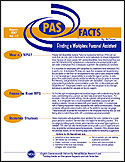
Information, resources and research about work and disability issues
New RRTC Fact Sheet on PAS Vol 2
 Finding
a Workplace Personal Assistant
Finding
a Workplace Personal Assistant
What is a WPA?
People with disabilities believe Personal Assistance Services (PAS) are services that are only used in the home to assist individuals to remain independent. Over the past 20 years people with severe disabilities have discovered they can use PAS services in the workplace as a reasonable job accommodation and consider a workplace PAS a necessary to perform the essential job functions. Read the PAS Fact sheet
This fact sheet is funded by a grant (#H133B040011) with the US DOE - NIDRR.
Start-UP-USA Online Seminar
 Quick-Launch Business Plan
Quick-Launch Business Plan
by Cary Griffin
This seminar is targeted to providers or other individuals who support people with disabilities in developing a business plan. The presentation is divided into eight segments, giving participants time to incorporate the lessons they learn in each segment into the business plan they are developing. View the Online Seminar
Start-Up-USA is funded by a cooperative agreement (# E-9-4-6-0111) from the U.S. DOL-ODEP.
Resources
 New
products are now available at our online store.
New
products are now available at our online store.
A new manual and CDs are available for purchase. Current CD and DVD prices have been reduced. These products are great tools for staff and new hires. Add them to your training library!
Print the brochure or Shop Online
CRP-RCEP Fact Sheet
Supporting Individuals with Autism in Integrated Community Jobs: Identifying Support Needs to Facilitate Success
People with autism are significantly under served in terms of achieving employment outcomes supported by the state/federal vocational rehabilitation (VR) program. While the data available is based on a narrow definition of autism used by the Rehabilitation Services Administration (RSA), only 0.6% of all successful VR closures in 2005 were individuals with autism. The actual number of successful closures in 2005 for individuals with autism was 1,141 (Dew & Alan, 2007).
This fact sheet is funded by a grant (#H264B050007) with the US DOE
- RSA.
National Institute on Disability and Rehabilitation Research (#H133B040011)
1314 West Main Street | P.O. Box 842011 | Richmond, Virginia 23284-2011
Phone: (804) 828-1851 | TTY: (804) 828-2494 | Fax: (804) 828-2193
| | |